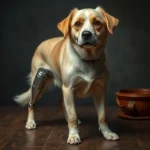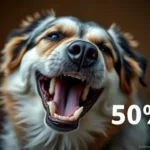
Introduction
Gluten sniffing dogs are specially trained canine companions that assist individuals with gluten-related disorders by detecting the presence of gluten in food and environments. These remarkable dogs play a crucial role in the lives of those affected by conditions such as celiac disease and non-celiac gluten sensitivity, providing not just safety but also emotional support.
The importance of gluten detection cannot be overstated. Celiac disease affects approximately 1 in 100 people worldwide, and the only effective treatment is a strict gluten-free diet. For those with gluten sensitivity, even trace amounts of gluten can trigger debilitating symptoms. Gluten sniffing dogs offer a solution by providing an additional layer of safety, enabling individuals to navigate their daily lives with greater confidence.
Understanding Gluten and Its Impact
What is Gluten?
Gluten is a group of proteins found in certain grains, primarily wheat, barley, and rye. It acts as a binding agent, giving dough its elasticity and helping baked goods maintain their shape. Gluten is found in a wide variety of foods, making it a common challenge for those needing to avoid it.
Health Effects of Gluten
The health implications of gluten consumption can be severe for individuals with celiac disease. This autoimmune disorder prompts the body to attack the small intestine when gluten is ingested, leading to symptoms such as:
- Abdominal pain
- Diarrhea
- Fatigue
- Weight loss
- Nutritional deficiencies
Non-celiac gluten sensitivity can also cause discomfort, albeit with different mechanisms and often without the same intestinal damage. Symptoms may include headaches, bloating, and joint pain. For both conditions, adhering to a strict gluten-free diet is paramount, and gluten sniffing dogs offer valuable assistance in this endeavor.
The Role of Dogs in Detection
Canine Sense of Smell
Dogs possess an extraordinary sense of smell, estimated to be between 10,000 to 100,000 times more sensitive than that of humans. This remarkable olfactory capability allows them to detect specific scents, including gluten, even in minute quantities. Their ability to differentiate between various odors makes them ideal candidates for detection work.
How Dogs are Trained to Detect Gluten
Training gluten sniffing dogs involves teaching them to recognize and signal the presence of gluten. This is typically done using scent discrimination techniques, where dogs are exposed to the scent of gluten-containing foods, such as bread and pasta. The training process often incorporates positive reinforcement—rewarding the dog with treats or praise when they successfully identify the scent. This method not only ensures accuracy in detection but also fosters a strong bond between the dog and its handler.
Benefits of Gluten Sniffing Dogs
For Individuals with Gluten Sensitivity
The primary benefit of gluten sniffing dogs is the enhanced safety they provide for individuals with gluten sensitivity. These dogs can alert their handlers to hidden gluten in food, allowing them to make safer dietary choices. Additionally, the companionship of a dog can lead to improved mental well-being, helping to alleviate anxiety related to gluten exposure.
For Families and Caregivers
For families and caregivers, gluten sniffing dogs can significantly reduce stress and anxiety. The presence of a trained dog allows families to enjoy meals together without the constant worry of gluten contamination. Moreover, dogs can assist in meal preparation, alerting their handlers to the presence of gluten-containing ingredients, which can be particularly useful in social settings or restaurants.
Success Stories
Notable Cases of Gluten Sniffing Dogs
There are numerous heartwarming success stories of gluten sniffing dogs making a difference in the lives of individuals with gluten sensitivity. For example, a dog named Bella, trained specifically to detect gluten, has helped her handler navigate social situations with ease. Bella alerts her owner before meals, ensuring that she can safely enjoy dining out without the fear of gluten exposure.
Community Impact
The impact of gluten sniffing dogs extends beyond individual stories. These dogs are becoming increasingly recognized in the celiac community, where initiatives and organizations are promoting the use of detection dogs. This growing awareness is fostering a supportive environment for individuals with gluten sensitivities, helping them feel more included and less isolated.
Training and Certification of Gluten Sniffing Dogs
Organizations Involved in Training
Several organizations specialize in training gluten sniffing dogs. These programs often collaborate with veterinarians and trainers experienced in scent detection. Organizations like “Dogs with a Job” and “Celiac Support Association” are at the forefront of this movement, providing resources and education to handlers and trainers alike.
Training Programs and Duration
Training a gluten sniffing dog typically takes several months and involves a structured program. Dogs are trained in various environments to ensure they can reliably detect gluten in different settings. The training process focuses on scent recognition, obedience, and socialization, which are crucial for a successful detection dog.
Considerations for Potential Handlers
Assessing Your Need for a Gluten Sniffing Dog
Before deciding to acquire a gluten sniffing dog, it’s essential to assess your specific needs. Consider factors such as your lifestyle, living situation, and the potential financial commitment involved in training and maintaining a detection dog. A thorough evaluation will help you determine if a gluten sniffing dog is the right choice for you.
Finding a Certified Gluten Sniffing Dog
When looking for a certified gluten sniffing dog, it is vital to research reputable trainers and organizations. Seek out trainers with a proven track record in scent detection, specifically for gluten. Inquire about their training methods, success stories, and the certification process to ensure you find a qualified companion.
Future of Gluten Sniffing Dogs
Innovations in Detection Technology
As technology advances, new methods for gluten detection are being developed. Innovations such as portable gluten testing kits and smartphone applications are gaining traction. However, the unique olfactory skills of gluten sniffing dogs will likely continue to complement these technologies, providing a dual approach to gluten detection.
Expanding Roles for Detection Dogs
The potential roles for gluten sniffing dogs are expanding. Future possibilities include their deployment in restaurants and schools, where they can help ensure safe food environments for individuals with gluten sensitivities. As awareness grows, the gluten sniffing dog community is expected to thrive, leading to more trained dogs and handlers in various settings.
Conclusion
Gluten sniffing dogs are more than just pets; they are invaluable companions that enhance safety and quality of life for individuals with gluten sensitivities. Their ability to detect gluten provides peace of mind, while their presence offers emotional support. As the demand for these remarkable dogs continues to grow, the community surrounding gluten detection is becoming increasingly supportive and resourceful.
For those interested in learning more about gluten sniffing dogs or exploring the possibility of acquiring one, there are numerous resources available. Supporting organizations that specialize in training detection dogs can also help expand their reach and impact within the gluten-sensitive community.









